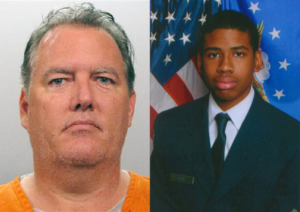
Though the Jacksonville jury deadlocked on the count of first-degree murder for the death of 17-year-old Jordan Davis, who was hit by three of the 10 bullets, Florida State Attorney Angela Corey said after the verdict that her office would retry Dunn for first-degree murder.
Still, legal experts pondered whether Corey would ultimately decide to go through with another gut-wrenching trial after Dunn’s sentences are rendered by Circuit Judge Russell Healey. Since each of the three attempted murder convictions carries a 20-year minimum and each of the sentences must run consecutively, not concurrently, when added to the conviction for shooting into the car (which brings up to another 15 years) Dunn is looking at 60 to 75 years in prison.
Analyst Richard Kurtz told USA Today that with Dunn facing at least 60 years in prison, which is a life sentence for a man of 47, Corey would probably consult with the Davis family and likely decide not to go through with a first-degree murder retrial.
Just as with George Zimmerman’s trial last year in the death of 17-year-old Trayvon Martin, the underlying question in this case—and in many other cases in courtrooms across the country—was, How scary are young black males?
A Florida jury concluded last year that Trayvon was scary enough for Zimmerman’s story of fear and threat to be believed. But this time the Florida jury didn’t completely buy Dunn’s story—even with the state’s Stand Your Ground law hovering in the background—that his fears of impending danger warranted opening fire on a car full of children. The deliberations stretched over four days and 32 hours.
While Davis’ parents left the courtroom in tears, Dunn turned to his lawyer, Cory Strolla, and asked, “How is this happening?” as if he had never considered the possibility of conviction.
“Obviously, my client is devastated at the outcome. Never saw it coming one bit,” Strolla said, confirming as much. “So it’s hard. It’s hard for the family. I know his family’s devastated.”
It will be at least two months before Dunn gets sentenced. After a sentencing report is prepared, which takes about a month, the attorneys will meet at on March 24 to schedule a sentencing date.
In an emotional news conference after the verdict, Jordan’s mother, Lucia Kay McBath, said the family was happy “to have just a little bit of closure.”
“It’s sad for Mr. Dunn that he will live the rest of his life in that sense of torment and I will pray for him and I’ve asked my family to pray for him,” she said. “But we are so grateful for the charges that have been brought against him. So grateful for the truth. So grateful that the jurors were able to understand the common sense of it all. We will continue to stand and continue to wait for justice for Jordan.”
“Thank you all for seeing that we were good parents to Jordan and he was a good kid,” his father, Ron Davis, said. “It wasn’t allowed to be said in the courtroom but he was a good kid. There are a lot of good kids out there. There are a lot of good nephews, grandsons, granddaughters. They should have a voice. They shouldn’t live in fear walking around the streets. We love our children, we love our families and we raise them not to fear each other and raise them to be good citizens and we expect the law to protect us. And that’s what I want the law to do, to protect Jordan as we protected Jordan.”
The altercation started when Dunn asked Jordan and his three friends—Tevin Thompson, Leland Brunson and Tommie Stornes—to turn down their music when he pulled his car into a parking space right next to theirs at a gas station—where there were other empty spaces available. Dunn alleges that a verbal altercation led to death threats and a shotgun was pointed at him.
Police who responded to the scene found no weapon inside the car.
Dunn insisted that he was afraid for his life and that’s why he shot Jordan, who was sitting in the back seat of the SUV.
Stornes, now 20, said Davis and his friends had been “girl shopping” at St. Johns Town Center mall before stopping at the gas station in the Durango, which was equipped with an amplifier and two 12-inch speakers.
Thompson, 18, testified that after Dunn parked his Volkswagen Jetta close to the SUV, he said, “Turn your music down. I can’t hear myself think.”
Though Thompson turned down the volume, Davis said, “(Expletive) that. Turn the music back up.”
So Thompson did.
After the verbal exchange continued, Davis told Dunn, “(Expletive) you.”
Dunn then asked Davis, “Are you talking to me?” before reaching for a gun and firing at Davis’ door.
Brunson, 18, a backseat passenger, said he tried to pull Davis down to take cover and when he called Davis’ name and he didn’t respond, he checked his body to see if he had been shot.
“When I reached and touched him, blood appeared on my fingers,” Brunson said.
In her testimony, Rhonda Rouer, Dunn’s fiancee, said she and Dunn had been drinking at the Thanksgiving weekend wedding of Dunn’s son. She said Dunn had several rum and cokes.
When they pulled into the gas station and heard the music, Dunn told her, ”I hate that thug music,” before she entered the gas station to buy wine and potato chips. She said she heard a series of popping noises, and saw Dunn put a weapon back in the glove box when she returned to the car.
After the couple left the scene of the shooting and returned to their hotel, Dunn ordered pizza and they had more rum and cokes, Rouer said.


